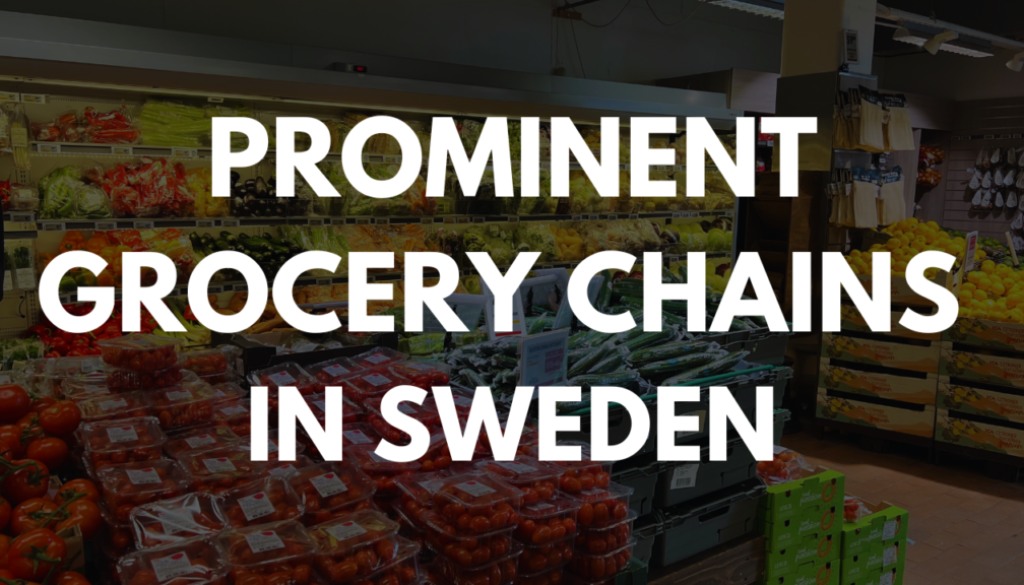Prominent Grocery Chains in Sweden
Last Updated on 2. Dec 2024 by b2bexport
Prominent Grocery Chains in Sweden are crucial in supplying essential groceries and household items to the public, and Sweden is no different. Across Europe and the world, grocery chains not only provide food but also non-food products, playing a significant role in the economy of other countries as well.
In Sweden, several notable supermarket chains serve the diverse needs of consumers nationwide. These chains are owned and operated by different groups, each adding to the competitive nature of Sweden’s retail market.
Major players like ICA Gruppen AB, Axfood Group, and Coop Sverige ekonomisk förening ensure that Swedish consumers have access to a broad array of products and shopping experiences.
ICA Gruppen AB
ICA Gruppen AB is a prominent player in Sweden’s retail sector. Headquartered in Solna, Sweden, the company operates numerous stores across the country.
ICA is known for its diverse range of products, including groceries, household items, and non-food products. With a focus on quality and customer satisfaction, ICA has established itself as a leader in the Swedish market.
Axfood Group
Another key player in the Swedish retail market is Axfood Group.
This company owns several supermarket chains, including Hemköp and Willys, which are well-known for offering a wide range of products at competitive prices. Axfood Group focuses on sustainability and environmentally friendly practices, ensuring that their operations positively impact the environment.
Coop Sverige ekonomisk förening
Coop Sverige ekonomisk förening, commonly known as Coop, is one of Sweden’s largest supermarket chains.
Headquartered in Stockholm, Coop operates numerous stores across Sweden, providing consumers with a variety of products, from fresh groceries to household essentials. Coop is recognized for its commitment to sustainability and community development, often engaging in practices that benefit both customers and the environment.
The Dynamic Nature of Sweden’s Retail Sector
Sweden’s retail sector is dynamic and constantly evolving, with supermarket chains continually adapting to meet the changing needs of consumers.
These companies invest in modern equipment, adopt new technologies, and implement innovative practices to enhance the shopping experience. For instance, many chains now offer apps that allow customers to shop online, use digital coupons, and access exclusive deals.
International Influence and Operations
While Sweden’s supermarket chains primarily operate within the country, their influence extends beyond borders.
For example, ICA Gruppen has partnerships with other companies in Europe, enhancing its reach and resources. Similarly, Axfood Group collaborates with international suppliers to offer a diverse range of products.
These collaborations not only benefit the companies but also provide Swedish consumers with access to products from other countries.
The supermarket chains in Sweden, including ICA Gruppen AB, Axfood Group, and Coop Sverige ekonomisk förening, play a vital role in the country’s retail sector. They provide essential products, drive economic development, and contribute to the overall well-being of the community.
As these companies continue to innovate and expand, they ensure that Swedish consumers have access to a diverse array of products and shopping experiences.
Major Supermarket Groups in Sweden
Based on information from various sources, here are the primary groups owning supermarket chains in Sweden:
ICA Gruppen AB:
- Majority Owner of ICA
- Market Share (2020): Approximately 52%
- Grocery Store Chains: ICA Nära, ICA Supermarket, ICA Kvantum, Maxi ICA Stormarknad
- Annual Turnover (2021): €9.09 billion
- Number of Outlets (2022): 1,271

ICA Gruppen AB is a leading figure in the Swedish retail industry, managing a range of grocery store chains familiar to many households.
With brands like ICA Nära, ICA Supermarket, ICA Kvantum, and Maxi ICA Stormarknad, ICA Gruppen meets diverse consumer preferences. The company’s dedication to quality products and extensive selection has made it a reliable name in the grocery sector.
Axfood Group:
- Independent Owner of Axfood Supermarket Chain
- Operating Profit (2020): Approximately 2.5 billion SEK
- Grocery Store Chains: Hemköp, Närlivs, Snabbgross, Tempo, Willys Hemma, Willys
- Annual Turnover (2020): €5.315 billion
- Number of Outlets (2022): 587
In 2021, Axfood acquired Bergendahls Food, including City Gross and Matöppet.

Axfood Group is another key player in Sweden’s grocery market, recognized for its innovation and focus on customer convenience.
Through popular chains like Hemköp, Willys, and Tempo, Axfood provides a variety of shopping experiences, from neighborhood markets to discount stores. The group’s commitment to sustainability and local sourcing appeals to environmentally aware consumers.
Coop Sverige ekonomisk förening:
- Owner of Coop Supermarket Chain
- Grocery Store Chains: Coop
- Annual Turnover (2020): €3.14 billion
- Number of Stores (2022): 809

Coop Sverige ekonomisk förening is notable in Sweden’s grocery scene as a cooperative organization dedicated to community and social responsibility.
With Coop stores across the country, the group emphasizes local sourcing, supporting local producers, and engaging in community-beneficial initiatives. Coop’s cooperative structure encourages member participation in decision-making, fostering a sense of community ownership.
Lidl:
- Owned by the Schwarz Gruppe
- Grocery Store Chain: Lidl
- Annual Turnover (2020): €1.31 billion
- Number of Outlets (2022): 205

Lidl, a German discount supermarket chain, entered the Swedish market in 2003 and quickly gained a foothold.
Known for affordable prices and efficient operations, Lidl offers a streamlined selection of products at competitive prices, appealing to budget-conscious shoppers. The company continues to expand in Sweden, focusing on value and cost-effectiveness. Other notable players in Sweden’s food retail sector include Reitan, operating the 7-Eleven and Pressbyrån chains, with a total of 393 outlets.
The Retail Industry in Sweden
The retail industry in Sweden is a vibrant and growing sector, meeting the diverse needs and preferences of the Swedish population. Known for innovation, high-quality products, and a customer-centric focus, the retail sector is a significant contributor to the country’s economy.
Retailers in Sweden, including grocery chains and stores offering non-food products, play a pivotal role in this dynamic landscape.
Emphasis on Sustainability
A key feature of Sweden’s retail industry is its strong focus on sustainability and ethical practices.
Swedish consumers are increasingly mindful of the environmental impact of their purchases. Retailers have responded by adopting sustainable sourcing practices, reducing packaging waste, and offering eco-friendly products.
This sustainability focus appeals to eco-conscious consumers and positions Swedish retailers as global leaders in sustainable practices, influencing retail trends in other countries as well.
Convenience and Digitalization
Convenience and digitalization are also crucial factors in Sweden’s retail sector.
With the rise of e-commerce and technological advancements, Swedish retailers have embraced digital strategies to enhance the shopping experience. Many physical stores now have online platforms, allowing customers to shop from home.
This blend of physical and online presence enables retailers to reach a broader audience and offer a seamless omnichannel experience, a practice adopted by companies worldwide.
Multinational and Local Retailers
Sweden’s retail industry features both multinational chains and local independent businesses.
Large chains like ICA Gruppen AB and H&M dominate the market, while smaller independent retailers preserve local traditions and offer unique products. This diversity creates a vibrant marketplace, providing consumers with a wide range of choices.
The retail sector also plays a crucial role in job creation in Sweden, offering various employment opportunities from sales to logistics.
International Influence
Sweden’s retail sector doesn’t only thrive domestically but also has a significant international presence.
Companies like IKEA have established themselves globally, with headquarters in Sweden but stores and operations in numerous countries, including France, Germany, and the United States. Swedish retailers like H&M and IKEA have been successful in acquiring a market share in different countries, influencing retail practices and sustainability standards worldwide.
Economic Contributions and Future Prospects
The retail industry stimulates economic growth and stability through job creation and consumer spending.
With a focus on sustainability, convenience, and innovation, Swedish retailers are well-positioned to meet future demands. Their practices have been adopted by retailers in diverse regions, including Europe and America, emphasizing the global influence of Sweden’s retail strategies. As Sweden continues to develop, the retail industry remains central to economic progress and consumer trends.
Its commitment to sustainability, convenience, and innovation positions it for ongoing growth and success.
With the integration of advanced technologies and a strong emphasis on ethical practices, Swedish retailers are set to lead the way in the global retail landscape.
Grocery Chains in Sweden – Conclusion
Sweden’s supermarket chains create a competitive landscape catering to diverse consumer needs.
From ICA Gruppen and Axfood Group’s customer-centric approaches to Coop Sverige ekonomisk förening’s cooperative values and Lidl’s budget-friendly model, each chain contributes uniquely to the Swedish market. These grocery chains not only thrive within Sweden but also extend their influence to other countries, incorporating non-food products to meet a broader range of consumer demands. Europe, as a whole, witnesses a robust grocery industry with companies like Lidl making significant strides in Poland, France, and Lithuania.
With ongoing trends in grocery shopping, Swedish consumers can look forward to an exciting and dynamic shopping experience.
The page was last edited in July 2024, reflecting the latest information on how these companies operate both locally and globally. Understanding the ownership and characteristics of these supermarket chains, consumers can make informed choices aligned with their values and preferences, be it convenience, sustainability, affordability, or community engagement. Whether headquartered in Sweden or expanding into other countries, these companies have adopted diverse practices to meet the needs of their customers.
Lidl, headquartered in Germany, operates not just in Sweden but also in countries like Italy and Switzerland, focusing on providing cost-effective solutions.
The success of these chains is defined by their ability to adapt to local economies and establish a presence that meets the varied demands of different markets. Incorporated strategies like accepting cash, offering coupons, and developing mobile apps show their commitment to modernizing the shopping experience. Swedish supermarket chains not only play a pivotal role in the local economy but also contribute to global exports, acquiring resources and equipment necessary for their operations.
By understanding these dynamics, Swedish consumers can choose stores that resonate with their needs, whether they prioritize affordability, sustainability, or innovation.
The diverse approaches of these grocery chains ensure that every customer can find a store that meets their specific preferences, resulting in a thriving supermarket sector in Sweden and beyond.




